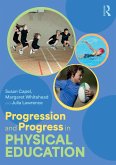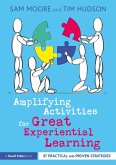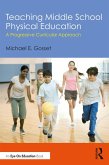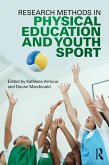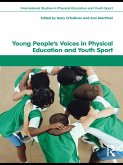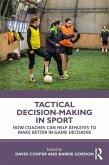Susan Capel, Margaret Whitehead, Julia Lawrence
Progression and Progress in Physical Education (eBook, PDF)
25,95 €
25,95 €
inkl. MwSt.
Sofort per Download lieferbar

13 °P sammeln
25,95 €
Als Download kaufen

25,95 €
inkl. MwSt.
Sofort per Download lieferbar

13 °P sammeln
Jetzt verschenken
Alle Infos zum eBook verschenken
25,95 €
inkl. MwSt.
Sofort per Download lieferbar
Alle Infos zum eBook verschenken

13 °P sammeln
Susan Capel, Margaret Whitehead, Julia Lawrence
Progression and Progress in Physical Education (eBook, PDF)
- Format: PDF
- Merkliste
- Auf die Merkliste
- Bewerten Bewerten
- Teilen
- Produkt teilen
- Produkterinnerung
- Produkterinnerung

Bitte loggen Sie sich zunächst in Ihr Kundenkonto ein oder registrieren Sie sich bei
bücher.de, um das eBook-Abo tolino select nutzen zu können.
Hier können Sie sich einloggen
Hier können Sie sich einloggen
Sie sind bereits eingeloggt. Klicken Sie auf 2. tolino select Abo, um fortzufahren.

Bitte loggen Sie sich zunächst in Ihr Kundenkonto ein oder registrieren Sie sich bei bücher.de, um das eBook-Abo tolino select nutzen zu können.
This book examines what progression in physical education looks like and the teachers' role in promoting progression within and across age phases. It sets out how teachers can plan for progression within individual or a series of lessons as well as developing pupils' learning and motivation over the medium and longer term.
- Geräte: PC
- mit Kopierschutz
- eBook Hilfe
- Größe: 12.77MB
Andere Kunden interessierten sich auch für
![Progression and Progress in Physical Education (eBook, ePUB) Progression and Progress in Physical Education (eBook, ePUB)]() Susan CapelProgression and Progress in Physical Education (eBook, ePUB)25,95 €
Susan CapelProgression and Progress in Physical Education (eBook, ePUB)25,95 €![Amplifying Activities for Great Experiential Learning (eBook, PDF) Amplifying Activities for Great Experiential Learning (eBook, PDF)]() Sam MooreAmplifying Activities for Great Experiential Learning (eBook, PDF)23,95 €
Sam MooreAmplifying Activities for Great Experiential Learning (eBook, PDF)23,95 €![Teaching Middle School Physical Education (eBook, PDF) Teaching Middle School Physical Education (eBook, PDF)]() Michael E. GossetTeaching Middle School Physical Education (eBook, PDF)30,95 €
Michael E. GossetTeaching Middle School Physical Education (eBook, PDF)30,95 €![Research Methods in Physical Education and Youth Sport (eBook, PDF) Research Methods in Physical Education and Youth Sport (eBook, PDF)]() Research Methods in Physical Education and Youth Sport (eBook, PDF)52,95 €
Research Methods in Physical Education and Youth Sport (eBook, PDF)52,95 €![Young People's Voices in Physical Education and Youth Sport (eBook, PDF) Young People's Voices in Physical Education and Youth Sport (eBook, PDF)]() Young People's Voices in Physical Education and Youth Sport (eBook, PDF)59,95 €
Young People's Voices in Physical Education and Youth Sport (eBook, PDF)59,95 €![Tactical Decision-Making in Sport (eBook, PDF) Tactical Decision-Making in Sport (eBook, PDF)]() Tactical Decision-Making in Sport (eBook, PDF)40,95 €
Tactical Decision-Making in Sport (eBook, PDF)40,95 €![What Great Coaches Do Differently (eBook, PDF) What Great Coaches Do Differently (eBook, PDF)]() Rob HaworthWhat Great Coaches Do Differently (eBook, PDF)22,95 €
Rob HaworthWhat Great Coaches Do Differently (eBook, PDF)22,95 €-
-
-
This book examines what progression in physical education looks like and the teachers' role in promoting progression within and across age phases. It sets out how teachers can plan for progression within individual or a series of lessons as well as developing pupils' learning and motivation over the medium and longer term.
Dieser Download kann aus rechtlichen Gründen nur mit Rechnungsadresse in A, B, BG, CY, CZ, D, DK, EW, E, FIN, F, GR, HR, H, IRL, I, LT, L, LR, M, NL, PL, P, R, S, SLO, SK ausgeliefert werden.
Produktdetails
- Produktdetails
- Verlag: Taylor & Francis eBooks
- Seitenzahl: 222
- Erscheinungstermin: 25. November 2024
- Englisch
- ISBN-13: 9781040193570
- Artikelnr.: 72283850
- Verlag: Taylor & Francis eBooks
- Seitenzahl: 222
- Erscheinungstermin: 25. November 2024
- Englisch
- ISBN-13: 9781040193570
- Artikelnr.: 72283850
- Herstellerkennzeichnung Die Herstellerinformationen sind derzeit nicht verfügbar.
Susan Capel is a Professor Emerita at Brunel University, London.
Margaret Whitehead is currently a Visiting Professor at the University of Bedfordshire and an Adjunct Professor at the University of Canberra.
Julia Lawrence is Assistant Professor at Northumbria University and Secondary Lead Mentor for Scarborough Teaching Alliance.
Margaret Whitehead is currently a Visiting Professor at the University of Bedfordshire and an Adjunct Professor at the University of Canberra.
Julia Lawrence is Assistant Professor at Northumbria University and Secondary Lead Mentor for Scarborough Teaching Alliance.
Unit 1 - Introduction
The purpose of this book: about us: about teachers: about the book:
permeation throughout the book: other resources; and so
Unit 2 - Progression, Progress and Learning
Progression and Progress: Progression in physical education: Progress in
physical education:
Learning: Theories of Learning: Principles for facilitating and enhancing
progress
Unit 3 - The Learner
The holistic nature of the learner endowed with a range of capabilities:
Growth and Development: Other factors which impact on learners: Principles
for facilitating and enhancing the learning of every learner
Unit 4 - Domains of Learning in Physical Education - An Introduction
Justification for the selection of the three domains of learning in
physical education: Analysis of the three domains: Using the Aspects and
Foci to recognise Learner Progress: The Ladders of Progress
Unit 5 - The Physical Domain
Descriptions of terms used in the unit: parameters of learning in physical
education in compulsory schooling: progress in the physical domain: Aspect
1 Movement Patterns: Aspect 2 Movement Activities
Unit 6 - The Cognitive Domain
The nature of the cognitive domain: The levels of cognitive process: The
types of knowledge: The cognitive domain in physical education: Aspect 1
Constituents and principles of movement: Aspect 2 Adopting a physically
active lifestyle
Unit 7 - The Affective Domain
The importance of attitudes in progress in physical education: Theory
related to the Affective Domain: Progress in the Affective Domain as
compared to progress in the Physical and Cognitive Domains: Progress in the
Affective Domain: Aspect 1 Motivation: Aspect 2 Confidence: Aspect 3
Autonomy
Unit 8 - Viewing the Physical, Cognitive and Affective Holistically
The holistic nature of individual learner progress: Scenarios of individual
learners illustrating the holistic nature of learning
Unit 9 - Teaching to Facilitate and Enhance Progress
Rational, reflective and responsive teaching: Learner-centred teaching:
Taking account of learners as holistic and unique: Using the ladders of
progress to support the holistic progress of each individual learner:
Principles for facilitating and enhancing progress: Supporting learners to
take responsibility for own learning
Unit 10 - Recognising and Charting Progress
Recognising and charting learner progress holistically: Recognising and
charting the progress of individual learners: Recognising progress:
Observation for learning: Assessment for learning: Feedback for learning:
Charting progress for learning: Supporting learners to develop their
ability to observe, assess provide feedback and to chart their own progress
Unit 11 - The Importance of a Progressive Curriculum in Supporting Learner
Progress
Definitions of curriculum and approaches to curriculum planning: The
physical education curriculum: Some key considerations in relation to
curriculum planning
Unit 12 - The Broader Context
Working together as a team: Working with others in the school: The external
context
The purpose of this book: about us: about teachers: about the book:
permeation throughout the book: other resources; and so
Unit 2 - Progression, Progress and Learning
Progression and Progress: Progression in physical education: Progress in
physical education:
Learning: Theories of Learning: Principles for facilitating and enhancing
progress
Unit 3 - The Learner
The holistic nature of the learner endowed with a range of capabilities:
Growth and Development: Other factors which impact on learners: Principles
for facilitating and enhancing the learning of every learner
Unit 4 - Domains of Learning in Physical Education - An Introduction
Justification for the selection of the three domains of learning in
physical education: Analysis of the three domains: Using the Aspects and
Foci to recognise Learner Progress: The Ladders of Progress
Unit 5 - The Physical Domain
Descriptions of terms used in the unit: parameters of learning in physical
education in compulsory schooling: progress in the physical domain: Aspect
1 Movement Patterns: Aspect 2 Movement Activities
Unit 6 - The Cognitive Domain
The nature of the cognitive domain: The levels of cognitive process: The
types of knowledge: The cognitive domain in physical education: Aspect 1
Constituents and principles of movement: Aspect 2 Adopting a physically
active lifestyle
Unit 7 - The Affective Domain
The importance of attitudes in progress in physical education: Theory
related to the Affective Domain: Progress in the Affective Domain as
compared to progress in the Physical and Cognitive Domains: Progress in the
Affective Domain: Aspect 1 Motivation: Aspect 2 Confidence: Aspect 3
Autonomy
Unit 8 - Viewing the Physical, Cognitive and Affective Holistically
The holistic nature of individual learner progress: Scenarios of individual
learners illustrating the holistic nature of learning
Unit 9 - Teaching to Facilitate and Enhance Progress
Rational, reflective and responsive teaching: Learner-centred teaching:
Taking account of learners as holistic and unique: Using the ladders of
progress to support the holistic progress of each individual learner:
Principles for facilitating and enhancing progress: Supporting learners to
take responsibility for own learning
Unit 10 - Recognising and Charting Progress
Recognising and charting learner progress holistically: Recognising and
charting the progress of individual learners: Recognising progress:
Observation for learning: Assessment for learning: Feedback for learning:
Charting progress for learning: Supporting learners to develop their
ability to observe, assess provide feedback and to chart their own progress
Unit 11 - The Importance of a Progressive Curriculum in Supporting Learner
Progress
Definitions of curriculum and approaches to curriculum planning: The
physical education curriculum: Some key considerations in relation to
curriculum planning
Unit 12 - The Broader Context
Working together as a team: Working with others in the school: The external
context
Unit 1 - Introduction
The purpose of this book: about us: about teachers: about the book:
permeation throughout the book: other resources; and so
Unit 2 - Progression, Progress and Learning
Progression and Progress: Progression in physical education: Progress in
physical education:
Learning: Theories of Learning: Principles for facilitating and enhancing
progress
Unit 3 - The Learner
The holistic nature of the learner endowed with a range of capabilities:
Growth and Development: Other factors which impact on learners: Principles
for facilitating and enhancing the learning of every learner
Unit 4 - Domains of Learning in Physical Education - An Introduction
Justification for the selection of the three domains of learning in
physical education: Analysis of the three domains: Using the Aspects and
Foci to recognise Learner Progress: The Ladders of Progress
Unit 5 - The Physical Domain
Descriptions of terms used in the unit: parameters of learning in physical
education in compulsory schooling: progress in the physical domain: Aspect
1 Movement Patterns: Aspect 2 Movement Activities
Unit 6 - The Cognitive Domain
The nature of the cognitive domain: The levels of cognitive process: The
types of knowledge: The cognitive domain in physical education: Aspect 1
Constituents and principles of movement: Aspect 2 Adopting a physically
active lifestyle
Unit 7 - The Affective Domain
The importance of attitudes in progress in physical education: Theory
related to the Affective Domain: Progress in the Affective Domain as
compared to progress in the Physical and Cognitive Domains: Progress in the
Affective Domain: Aspect 1 Motivation: Aspect 2 Confidence: Aspect 3
Autonomy
Unit 8 - Viewing the Physical, Cognitive and Affective Holistically
The holistic nature of individual learner progress: Scenarios of individual
learners illustrating the holistic nature of learning
Unit 9 - Teaching to Facilitate and Enhance Progress
Rational, reflective and responsive teaching: Learner-centred teaching:
Taking account of learners as holistic and unique: Using the ladders of
progress to support the holistic progress of each individual learner:
Principles for facilitating and enhancing progress: Supporting learners to
take responsibility for own learning
Unit 10 - Recognising and Charting Progress
Recognising and charting learner progress holistically: Recognising and
charting the progress of individual learners: Recognising progress:
Observation for learning: Assessment for learning: Feedback for learning:
Charting progress for learning: Supporting learners to develop their
ability to observe, assess provide feedback and to chart their own progress
Unit 11 - The Importance of a Progressive Curriculum in Supporting Learner
Progress
Definitions of curriculum and approaches to curriculum planning: The
physical education curriculum: Some key considerations in relation to
curriculum planning
Unit 12 - The Broader Context
Working together as a team: Working with others in the school: The external
context
The purpose of this book: about us: about teachers: about the book:
permeation throughout the book: other resources; and so
Unit 2 - Progression, Progress and Learning
Progression and Progress: Progression in physical education: Progress in
physical education:
Learning: Theories of Learning: Principles for facilitating and enhancing
progress
Unit 3 - The Learner
The holistic nature of the learner endowed with a range of capabilities:
Growth and Development: Other factors which impact on learners: Principles
for facilitating and enhancing the learning of every learner
Unit 4 - Domains of Learning in Physical Education - An Introduction
Justification for the selection of the three domains of learning in
physical education: Analysis of the three domains: Using the Aspects and
Foci to recognise Learner Progress: The Ladders of Progress
Unit 5 - The Physical Domain
Descriptions of terms used in the unit: parameters of learning in physical
education in compulsory schooling: progress in the physical domain: Aspect
1 Movement Patterns: Aspect 2 Movement Activities
Unit 6 - The Cognitive Domain
The nature of the cognitive domain: The levels of cognitive process: The
types of knowledge: The cognitive domain in physical education: Aspect 1
Constituents and principles of movement: Aspect 2 Adopting a physically
active lifestyle
Unit 7 - The Affective Domain
The importance of attitudes in progress in physical education: Theory
related to the Affective Domain: Progress in the Affective Domain as
compared to progress in the Physical and Cognitive Domains: Progress in the
Affective Domain: Aspect 1 Motivation: Aspect 2 Confidence: Aspect 3
Autonomy
Unit 8 - Viewing the Physical, Cognitive and Affective Holistically
The holistic nature of individual learner progress: Scenarios of individual
learners illustrating the holistic nature of learning
Unit 9 - Teaching to Facilitate and Enhance Progress
Rational, reflective and responsive teaching: Learner-centred teaching:
Taking account of learners as holistic and unique: Using the ladders of
progress to support the holistic progress of each individual learner:
Principles for facilitating and enhancing progress: Supporting learners to
take responsibility for own learning
Unit 10 - Recognising and Charting Progress
Recognising and charting learner progress holistically: Recognising and
charting the progress of individual learners: Recognising progress:
Observation for learning: Assessment for learning: Feedback for learning:
Charting progress for learning: Supporting learners to develop their
ability to observe, assess provide feedback and to chart their own progress
Unit 11 - The Importance of a Progressive Curriculum in Supporting Learner
Progress
Definitions of curriculum and approaches to curriculum planning: The
physical education curriculum: Some key considerations in relation to
curriculum planning
Unit 12 - The Broader Context
Working together as a team: Working with others in the school: The external
context

